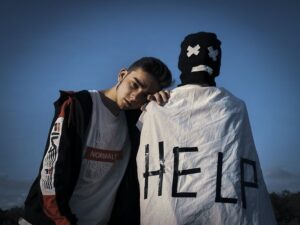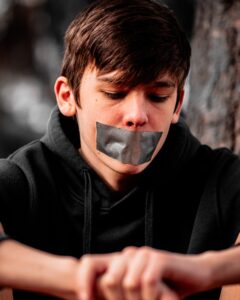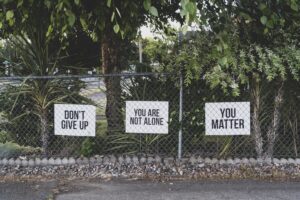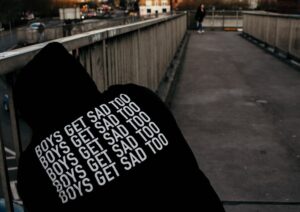

Many of us have heard the phrases: What happens at home stays at home, or build a bridge and get over it. These phrases, especially when heard as a child, create a shadow avenue of secrecy in regard to unsavory issues. These phrases solidify unhealthy conditioning, and the idea that one has to hold in emotions, trauma, and toxic situations to “save face” for the family. Issues such as neglect, physical, emotional, verbal, mental, and/or sexual abuse are common among these secretive, shadowy situations. Holding in these issues and not talking about what has affected or harmed us leads to unhealthy coping mechanisms, which will draw more toxic relationships toward us as adults.
As an example: Liu, W., Mumford, EA., and Taylor, BG. Indicated in their research, “Children of parents who experienced verbal abuse were more likely to experience similar patterns in their own relationships, whereas children of parents who report physical and verbal abuse were more likely to experience psychological, physical, and sexual abusive encounters in their partnerships. Findings indicate that parent’s relationship quality and abusive behaviors may have a long lasting effect on their children as they enter mid and late adolescence.”
The cliché, “What happens at home stays at home,” has been instilled in both males and females, and passed down from generation- to- generation. Unfortunately, the conditioned belief system has created lasting negative effects. As indicted by When Men Open Up, “The phrase, while it may not always have malicious intent, could incite individual to hide their feelings, or exclude allies from situation that should not be left in the hands of one person.” For example: according to the National Sexual Violence Resource Center: one in four girls will be sexually molested, and one in six boys will be sexually molested before the age of eighteen.” Furthermore, indicated by When Men Open Up, “Many of these individuals have been told to keep these traumatic experiences between those in the house, and the effects of these are seen daily.”

During a panel discussion organized by: Verity Sonoma County’s Rape, Crisis, Trauma, and Healing Center, a group of us were asked to speak and advocate as survivors of a violent crime. I, Mimi Amaral, met an inspiring man who was also speaking on the panel; this man has requested to remain anonymous. He volunteered to speak to advocate that men are also molested, raped, and abused. It is not often that I encounter or witness a man speaking up as a survivor, let alone bringing awareness to the fact that boys and men are abused. When I met this man, and his wife, I was grateful to hear his story. I suggested and encouraged him to write a book about his journey to help other boys and men who may have encountered molestation and/or rape during their life. I also requested he allow me to write this article so I too may help get his story out, and bring awareness that men are abused too.
This man’s story is important for multiple reasons. First, to help boys and men understand that it is okay to come forth regarding their abuse; second, that males are abused and sexually assaulted more often than one may think. As indicated by 1in6, “Researchers have found that at least 1 in 6 men have experienced sexual abuse or assault, whether in childhood or as adults. And this is probably a low estimate, since it doesn’t include noncontact experiences, which can also have lasting negative effects.” Furthermore, RAINN indicated that, “Male college-aged students [18-24] are 78% more likely than non-students of the same age to be victims of rape or sexual assault.”
After speaking on the panel for Verity, I asked this man if I could call him and interview him. He was very interested and willing to share his story to help others. The following testimony is from his transcribed interview with me. He shares his in depth journey and recovery:
I grew up in a military family and lived in four different places, my father was an officer in the military, but as a family we were not privy to the information or details of his position; the military used him at the pentagon and high security locations. We were always a part of this military family group. What that meant was that we were a tight nuclear family, and of course growing up in a military family there was always a lot of structure and discipline that went a long with it. For a long time it was pretty normal, I use to dress up in my father’s uniform. We were daddies little soldiers that is what we were, and that is what we aspired to be. We had a lot of weight on our shoulders as kids because when you are in the military you can’t have kids fighting with other kids because if your kids fight then it starts getting reflected onto your parent’s reputation, and that in the military is looked up on like if you’re not able to manage or handle your own children than you are not capable of succeeding in the military. So for my father’s career, bright future, and promotions in the rankings in the service we had to keep in line.
I grew up with an older brother who was five years older than me, and how any five year older sibling would do, you kind of teach your younger sibling the way of life, and one of those things he taught me was learning how to survive and learning what it meant to “be a good soldier” and be “strong, courageous, and brave.” He also taught me that you can use physical strength to force compliance when needed. So what that meant was, I suffered at the hands of my own older brother with a lot of physical abuse, and there was a lot of trips to the emergency room with broken bones and stitches, and that nature, but you know when everyone got back home each said their sorry, and it was swept under the rug. The excuse for it was “it was just boys being boys,” and that would be something I continued to hear a lot throughout my childhood and adolescence.
I had a lot of physical scars and those scars turned emotional, and at the age of eleven-ish my brother raped me and it changed my life forever. It opened up this whole level of vulnerability and confusion around what had happened, and what it meant and how I was going to later further process these things. I did not know what sex was because my first experience with it was being raped by an older male sibling, so I did not know who I really identified as. I really didn’t have an idea of what sexual orientation meant never the less where I fell upon any sort of that spectrum. It also engraved in me a big sense of fear for intimacy that continued along through into marriage. Not knowing those answers to a lot of those questions I had confusion around it, and that just led me to being exposed to more abuse and more question; more fear and guilt that I would end up carrying around for a long time.
The moment the rape happened I essentially swept it under the rug because that was the conditioning from the family unit dynamics and reaction to situations such as this. I knew for my own survival and knowing I needed to be the soldier I was supposed to be. I needed to be very quiet about it. I did not want to have these types of questions, it was not something I was interested in even finding out answers for at this point. I just knew I needed to be very quiet about it.

When this all happened I lived in the United States; in a place that exuded the likeness of the book Friday Night Lights if you’re familiar with that book we called that place “God’s Country.” Friday night was football and Sunday morning was Church. And, it really didn’t matter what type of life style you lived during the week, on Sunday morning you were at church. So society and culture really kind of dictated this demand for people in its culture to belong to a church. You meet somebody and say, “Hi my name is …” The first thing they say is, “Hi, where do you go to church?” You know, and if you didn’t have an answer for it you were at their church the next Sunday.
So my father ended up retiring and became a professor at one of the Christian universities in town. I needed to find a church, and at a recommendation of a friend started getting into it. I got baptized into the church and thought my life was turning around for me, but at the same time I was out parting and my brother was also introducing me to alcohol and drugs, and what that began at age 14 was a very long road of thorns in my flesh, as I call it. I would use to find fleeting glimpses of comfort in a false escape from reality. I became addicted to alcohol, dabbled in drugs, used a lot of nicotine, and found comfort in food and over eating, which ultimately led to a lot of unhealthy choices, courtroom visits, visits in local jails, damage in relationships, and overall wreck of life whether it be literal or figurative. I never should have lived. Looking back there were many times my reactions to how I was using these unhealthy coping mechanisms never should – Ah – I never should have been able to walk away from it.

Luckily I became a good soldier out of the mix, so whenever my life was actually falling apart I could put on this great “mask” to make everyone think my life was just fine. I chased after a perpetual closeness of others, something that lacked a sense of paternal bonding that I missed out on, and that has led all the way into being an adult where I find myself subconsciously desiring to have a bonding with a paternal aspect, which means I’m always trying to give myself to everyone else in an attempt to be in this bonded type of relationship because it was something I missed out on. Despite having the desire to be close, I also had a lot of trust issues and I wouldn’t let anyone get too close to me. I figured this was just the way of life. I put on the mask, went on to college, and continued to stumble a lot with how I was reacting to what had happened to me through making more bad choices, and finding a lot of comfort in the bottom of a bottle, which definitely led to a lot of complications.
I tried to sober up, which lasted about six months but then I moved away and found myself getting back into my addictive behaviors and addictions; continued that path. Fast forward, I’m in my twenties, my brother who raped me was charged with four counts of rape of a child. On verdict day his verdict came back as hung jury due to mistrial. That whole time I continued to sweep things under the rug for the sake of the family. Even though we were all grown and beyond there was still this idea that I was conditioned with which was “everything was swept under the carpet, and you kept everything together for the family.” Because there is a lot of prestige in having this perfect image of a family; we are continuing to do it, which led to a lot of guilt and shame that I would sit there and go to bat on behalf of my brother who was charged for things that were very similar to what had happened to me. I felt during the trial I could not trust the victim, the kid; I could only trust the perpetrator because of the conditioning of the nuclear unit beliefs that I grew up with.
I continued to go about my life, got into the industry, and become a part time fire fighter … “I could save your life, but I couldn’t save myself.” I continued to choose a lot of reckless behaviors and rock-star life style, and it led to a lot of broken relationships, broken dreams, and suicidal ideations. I was going down a really bad path. I also was a victim to domestic violence from a live in girlfriend, but I was equally a mess in my life. I ended up moving back home for a little bit, tried to get sober again, and that didn’t really work out. Then about eight years ago my niece, from my brother’s second wife, who passed away at the hands of a drunk driver … Everything was always swept under the carpet due to the way I was raised, but I ended up moving all the way from one part of the U.S. to another just to help them with the loss of their daughter, and with their growing family because his wife was pregnant. So I moved into the house of my perpetrator, and I continued to act like everything was fine and nothing ever happened. I, due to my conditioned belief from childhood, created this false ideal that we were family; while I’m still struggling with my addictions and trauma. I had to reign in my addiction and alcoholism because my brother’s wife just lost her daughter from a drunk driver, but my addiction was still there and it was in a place where it was hidden. I’m not as bad handling life problems as I did in past.
Few months later I was in an accident myself from a car being in a high speed chase, which messed up my back so I was taking a lot of pain killers to function. One night I was at a party, I had taken my pain killers and drinking, and I’d like to think this was the darkest before the dawn. This was the rock bottom that is talked about in recovery. After completely blacking out for a while, when I woke I drove home, got back to my brother’s house, pulled out my gun and looking down the barrel of the gun thinking, “How did it ever come to this point?” I had suicidal ideation before, but this was different, this was it. The questions: “Why me – Why am I having to suffer from all these emotional scars?” These all came about in that moment. My brother pulled the gun out of my hands; literally my perpetrator saved my life. My brother called 911; law enforcement walked in and saved me from myself.
On May 29, 2011 I got sober and have not had a drink or any drugs ever since. Since then it has been an amazing journey I have been on, it is not easy and I had a lot of moments where I look back and ask what is this all for anyway. Luckily, God has released me of all my desire to do any addictive substances, and created in me a foundation to work through me; and that is when I started processing my childhood sexual assault. I found that I needed to find coping mechanisms to get me through, and that is when I found male survivor groups. I found really interesting things on my journey of healing like celebrate recovery, which is a Christian AA program, beyond focus of addiction; Very grateful for this program.
These days I’m working on my control issues, like trying to control everything around me. Growing up with the abuse I had and realizing that the moment of time in my life where I was very vulnerable; I felt out of control and that is when I fell in the hands of perpetrators, and what their intentions were and not where I wanted to go. So since then I spent my entire life just trying to control everything around me, and be very vigilant to the constant borage of sensations and everything around me. Growing up in a military family there is a lot of life and ingrained belief of war time battles and we were daddies little soldiers; and the battle and the war I went through was in my own family dynamics, conditioning, culture beginning with mental conditioning, to physical and sexual abuse. There are still moments of being over stimulated from something I can’t handle, and I can see myself being triggered and want to react with anger or rage. This is what I’m still working on.
Today I have a beautiful wife and family, and I am no longer in touch with my brother. It is healthier for me and my family to close that door and continue on a healthy path toward the future to continue healing. I do not feel shame, guilt, or lose sleep over that decision.

As I listened to this man disclose the journey of his life, and the inner shadow of the hidden layers of his abuse and struggles, yet again it brought forth the fact that ‘no one is immune’ to violence or predatory behavior. It would seem as we age, the unveiling of truth becomes more readily available. Maybe this is because our psyche is stronger and can integrate the horrors of reality in a more constructive way so that we as the collective can take it upon ourselves to speak-up, advocate, and bring awareness to issues that need to change.
A more in depth look at male abuse from RAINN disclosed that, “Sexual assault can happen to anyone, no matter your age, your sexual orientation, or gender identification. Men and boys who have been sexually assaulted or abused may have many of the same feelings and reactions as other survivors of sexual assault, but they may also face some additional challenges because of social attitudes and stereotypes about men and masculinity.” Furthermore, as indicated by RAINN, the perpetrators can be of any gender identity, which means it can also be a female. The perpetrator may be any age, relation, and sexual orientation; and he or she may use psychological, emotional, verbal, or physical coercion or force as a tactic.

The 1 in 6 organization reported a lot of research on this subject, and within their findings it suggested that many symptoms and issues may arise from the abuse, which may lead to: Symptoms of post-traumatic stress disorder and depression; Alcoholism and drug abuse; suicidal thoughts and suicide attempts; problems in intimate relationships; and underachievement’s at school and at work. Many of this man’s symptoms and behavior’s within his testimony and life process seemed to follow many of the listed symptoms above. It begs the question, “If there was more awareness about boys and men being abused, would this man and males like him be able to get help sooner?”
Some common reaction, pointed out by RAINN, that both boys and men have may consist of, “As adults feel shame or self-doubt, believing that they should have been ‘Strong enough’ to fight off the predator… Men who were sexually assaulted as boys and teens may also respond differently than men who were sexually assaulted as adults.” RAINN outlined the following symptoms for males who have been assaulted as a boy, teen, or man, this is not an exhaustive list:
• Anxiety, depression, post-traumatic stress disorder, flashbacks, and eating disorders
• Avoiding people of places that remind you of the assault or abuse
• Concerns or questions about sexual orientation
• Fear of worst happening and having a sense of a shortened future
• Feeling like “less of a man” or you no longer have control of your own body
• Sense of blame or shame over not being able to stop the assault or abuse, especially if you experienced and erection or ejaculation
• Worrying about disclosing for fear of judgment or disbelief
Everything discussed in this material can occur to males, it occurs more often than most want to admit. These issues need to be addressed so males of all ages feel safe, supported, and not judged when they want to report abuse. Not only does sexual abuse and assault need to be witnessed, the fact that males are also abused by female perpetrators needs to be acknowledged as well. There are many females who abuse in multiple ways, and in multiple relationships that they engage in with boys and men. Women whether in a mother-son relationship, friend-friend relationship, or female-male intimate relationship are more likely to implement: guilt, fear, emotional, psychological, verbal abuse, gas lighting techniques, and passive-aggressive behaviors but may also implement physical and/or sexual abuse as well.
There are ways in which males can find help with the above issues and report their abuse. This list has been created by RAINN:
• Visit the Helpline https://1in6.org/helpline/
• Visit online.rainn.org https://hotline.rainn.org/online
• Call the National Sexual Assault Helpline 800- 656 – HOPE [4763]
• Consider Therapy or other mental help support
It has been this man’s aspiration to share his story to help others and express that, “To me, my story is a story of grace, mercy, and redemption despite cultural and social walls that we’ve built around masculinity. Breaking out of the “man-box” that our organizations, families, societies and cultures have used to paint my picture for me without letting me be me, to experience myself before culture tells me who I should be.” My aspiration in writing this article is with the hope the material has empowered, witnessed, and helped this man’s aspiration to help others; as well as encourage all males [i.e. boys, teens, and men] to understand that they are not alone. They too are held and supported.
References
1in6. The 1 in 6 Statistics. 2020. Retrieved: https://1in6.org/get-information/the-1-in-6-statistic/
Liu, W., Mumford, EA., & Taylor, BG. The Relationship between Parents’ Intimate Partner and Youths’ Adolescent Relationship Abuse. Department of Public Health Research, NORC at the University of Chicago, Bethesda, MD, USA. Retrieved: ncbi.nlm.nih.gov/pubmed/28894996?
fbclid=IwAR3ond4hgy3uY0YI9oopB9FLUem9zchuLgomlIBgc9cfGSQOTzYZ_T6BnGo
National Sexual Violence Resource Center. 2018. Get Statistics. Retrieved: nsvrc.org/node/4737. October 31. 2019
RAINN: Rape Assault Invest National Network. Campus Sexual Assault, Statistics. 2020. Retrieved: https://www.rainn.org/statistics/campus-sexual-violence
When Men Open Up. 24 April, 2019. “What Happens In this House, Stays In This House.” Retrieved: whenmenopenup.com/blogs/f/what-happens-in-this-house-stays-in-this-houseOctober 31. 2019.
Verity, Sonoma County’s Rape, Crisis, Trauma, and Healing Center. 2018. Retrieved ourverity.org/




Such a informative blog with great knowledge.
I appreciate your supportive comments.
Much Gratitude … Wishing you and yours a safe and wonderful new year
I am amazed with this blog.
Thank you for your supportive comment
Much Gratitude. Wishing you and yours a safe and wonderful new year